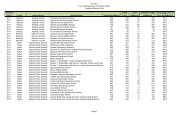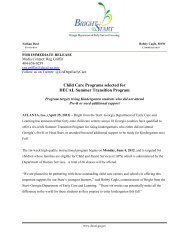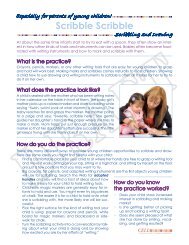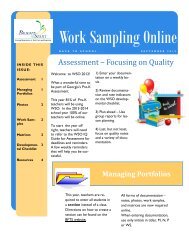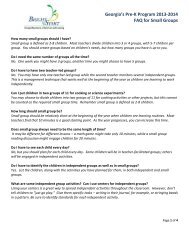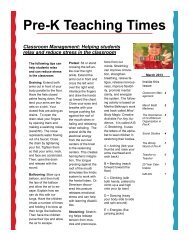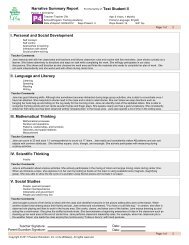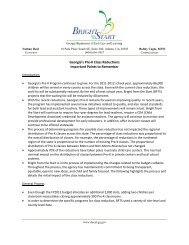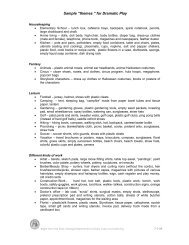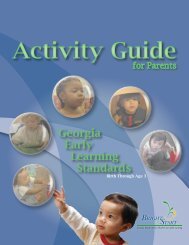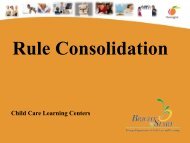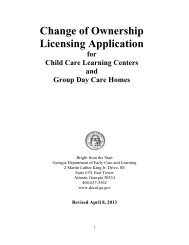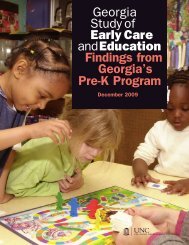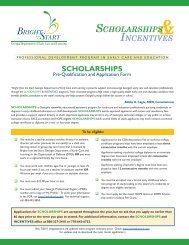Georgia Study of Early Care and Education: Child - Bright from the ...
Georgia Study of Early Care and Education: Child - Bright from the ...
Georgia Study of Early Care and Education: Child - Bright from the ...
Create successful ePaper yourself
Turn your PDF publications into a flip-book with our unique Google optimized e-Paper software.
Table 8. Highest Degree <strong>and</strong> Major for<br />
Lead Teachers<br />
Associate’s degree with major in early<br />
childhood<br />
Bachelor’s degree with major in early<br />
childhood<br />
Graduate degree with major in early<br />
childhood<br />
8% Associate’s<br />
Figure 7. <strong>Education</strong> Level <strong>of</strong><br />
Infant/Toddler Assistant Teachers<br />
8% Bachelor’s<br />
4% Master’s<br />
40% Some College<br />
Infant/<br />
Toddler<br />
6% Some High<br />
School<br />
34% High School<br />
Preschool<br />
7% 11%<br />
2% 4%<br />
1% 1%<br />
O<strong>the</strong>r education major, any degree 2% 5%<br />
O<strong>the</strong>r non-education major, any degree 10% 13%<br />
No Associate’s, Bachelor’s, or Graduate<br />
degree<br />
<strong>Georgia</strong> <strong>Study</strong> <strong>of</strong> <strong>Early</strong> <strong>Care</strong> <strong>and</strong> <strong>Education</strong>: <strong>Child</strong> <strong>Care</strong> Center Findings<br />
77% 67%<br />
Table 9. In-Service Training Topics for<br />
Lead Teachers in <strong>the</strong> Past Year<br />
About <strong>Child</strong>ren<br />
Figure 8. <strong>Education</strong> Level <strong>of</strong><br />
Preschool Assistant Teachers<br />
3% Master’s<br />
3% Some High<br />
School<br />
18% Bachelor’s 21% High School<br />
9% Associate’s<br />
46% Some College<br />
Infant/<br />
Toddler<br />
Preschool<br />
Health <strong>and</strong> safety practices 82% 82%<br />
Classroom management/discipline 68% 68%<br />
Observing, assessing, <strong>and</strong> documenting<br />
children’s progress <strong>and</strong> development<br />
58% 53%<br />
Social-emotional development 65% 71%<br />
<strong>Early</strong> language <strong>and</strong> literacy 39% 52%<br />
Using a curriculum 54% 70%<br />
Working with children with special needs 35% 44%<br />
Physical activity 53% 50%<br />
Working with children <strong>and</strong> families <strong>from</strong><br />
different cultures <strong>and</strong> races<br />
45% 47%<br />
<strong>Early</strong> science 19% 37%<br />
<strong>Early</strong> math 19% 32%<br />
Working with English Language Learners 16% 24%<br />
About Adults<br />
Managing conflicts in a pr<strong>of</strong>essional<br />
manner<br />
39% 40%<br />
Nutrition education for employees 23% 37%<br />
Wellness education for employees 30% 29%<br />
13



